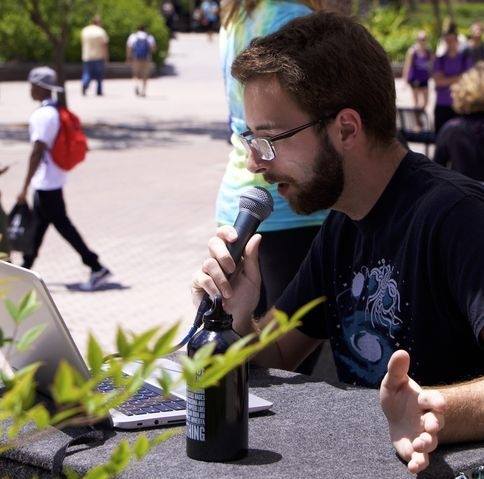Using Vocal Cords to Unlock Human Origins

UCF undergraduate student Austin Stanley is majoring in anthropology and tackling the question of human origins at the same time. More specifically, he’s studying the vocal capabilities of homo heidelbergensis, a more direct human ancestor than Neanderthals, to get a broader sense on when spoken language of humans began.
This can be determined through looking at the vocal tracts of the heidelbergensis, which Stanley does alongside John Starbuck, Ph.D., and Edward González-Tennant, Ph.D.
“We are analyzing the dimensions of the homo heidelbergensis vocal tract to discover what vowel sounds they could or couldn’t have possibly produced,” Stanley said. “The length and area of the vocal tract directly correlates to the range of vowel sounds an individual can possibly produce.”
Measuring the vocal tracts can be done using equipment in Starbuck’s lab and a process known as photogrammetry, where photographs are taken and translated into measurements and eventually into a rendered 3D image. Stanley will be measuring UCF’s Hominin fossil casts to collect measurements on the heidelbergensis’ skeletal landmarks that delineate their vocal tract. This is useful since the dimensions of their vocal tract can determine the vocal range of heidelbergensis.
“For instance, the dimensions of the Neanderthal laynx means they would have likely been unable to produce the sound ‘ah’ as in father, with the closest parallel sounding more like an ‘euh’ in could,” Stanley said.
Using measurements he collects, Stanley will be able to create audio data replicating that of the heidelbergensis. This will allow him to truly understand the
potential vowel range of our human ancestors and ultimately learn more about the “big picture” of human origins.
“There are many questions that could be considered ‘big picture questions’ in the field of human origins,” Stanley said. “’When did our big brains evolve? When did we learn to walk upright? When did we learn to use tools? I decided to tackle the question of when we learned to speak, mainly because there are not as many conclusive answers to this question when compared to the others.”
This paleoanthropological approach to Stanley’s research stems from his interest in the creation of the universe, which drove his decision to major in anthropology at UCF.
“I originally wanted to study religion, because I’ve always been fascinated by the variety of ideas that people have for explaining the creation of the universe,” he said. “I was particularly interested in the origins of humans. After taking a few religion classes, I realized it was too subjective of a field to come up with any conclusive answers for that sort of question. That’s when I started to look at the question through anthropology, particularly.”
Through a human origins course required for his anthropology degree, Stanley was introduced to Starbuck, who taught the course.
“From day one I knew I wanted Dr. Starbuck to be my thesis chair,” Stanley said. “I knew he would be the perfect fit for this sort of research topic.”
Aside from Starbuck, Stanley is excited about the anthropology classes required within UCF’s curriculum.
“I’ve been genuinely interested in most of the anthropology classes I’ve taken so far, and going to campus to research or make it to a class never seems like a chore,” Stanley said.
There have also been opportunities and help offered through UCF that have aided Stanley in pursuing his research goals.
“The most significant help I have gotten so far was a $5000 donation from an anonymous donor who took interest in my academic career and, out of the goodness of their heart, decided to send support my way,” he said. “I don’t know who it was, but if they end up reading this, I want to sincerely thank them.”
Stanley graduates this spring with his bachelor’s degree, and hopes to attend graduate school to focus on biological anthropology and receive his masters and a doctorate. Afterwards, he hopes to continue his research and obtain a job at a university as a professor.
